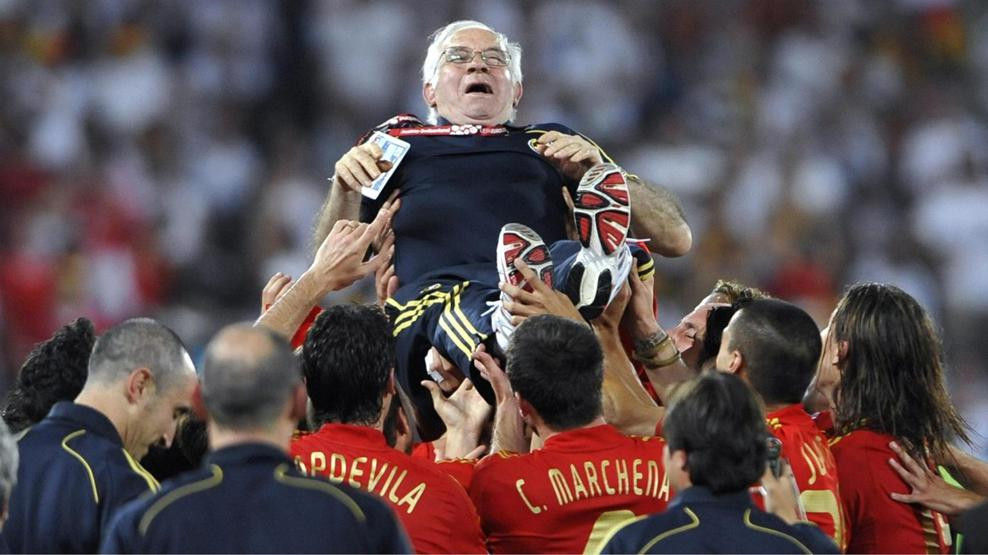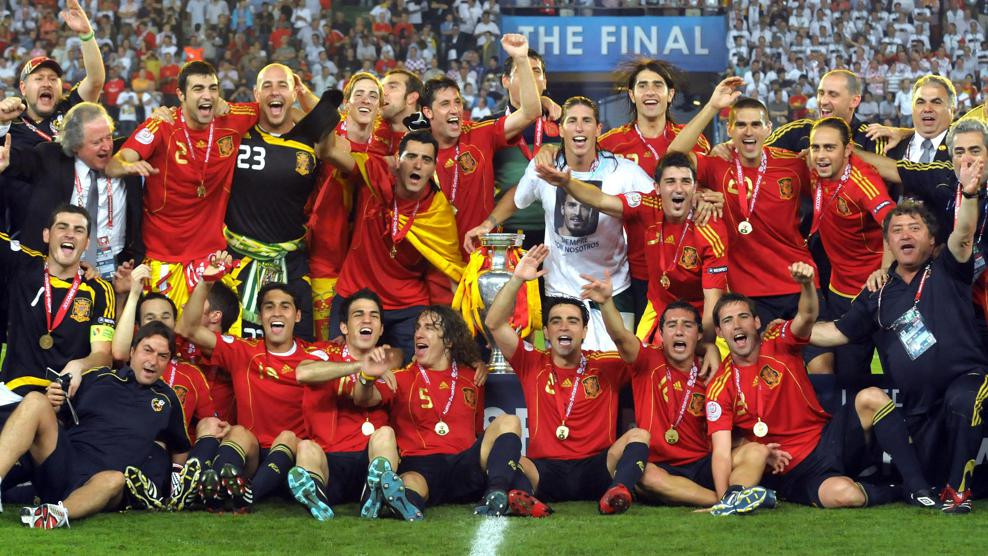The Uefa Euro 2008 Final, held in Vienna, Austria, witnessed a historic moment as Spain clinched their second European Championship title, defeating Germany 1-0. Fernando Torres’s decisive first-half goal ended Spain’s 44-year wait for major international silverware, marking the beginning of a golden era for Spanish football. This victory at the Ernst-Happel-Stadion not only brought an end to decades of underachievement but also showcased a captivating brand of football that would define Spain’s dominance for years to come.
A Tactical Battle in Vienna: Spain’s Ascendancy
The final was highly anticipated, pitting two European powerhouses against each other. Germany, aiming for their fourth Euro title, entered the match with a reputation for resilience and efficiency. Spain, under the guidance of Luis Aragonés, were on a quest to overcome their historical quarter-final barrier and finally realize their potential on the international stage. Despite Germany’s strong start, it was Spain who gradually asserted their dominance, dictating the tempo and creating the more clear-cut opportunities.
Germany received an early morale boost with the inclusion of captain Michael Ballack, overcoming a calf injury to lead his team. This seemed to energize the German side initially, as they pressed Spain high up the pitch in the opening minutes. However, Spain’s midfield maestros, Xavi Hernández and Andrés Iniesta, soon began to weave their magic, gradually taking control of possession and rhythm. The tactical setup saw Spain line up in a 4-5-1 formation, adapting to the absence of their leading scorer David Villa, who was sidelined due to a thigh injury. Cesc Fàbregas, fresh from a stellar semi-final performance, earned a starting role, adding creativity to the Spanish midfield.
 Andrés Iniesta in action during the UEFA Euro 2008 final
Andrés Iniesta in action during the UEFA Euro 2008 final
Torres’s Decisive Strike: A Moment of Spanish Brilliance
While Germany started brightly, their initial crisp passing and glimpses of goal through Miroslav Klose and Thomas Hitzlsperger didn’t translate into sustained pressure. As the first half progressed, Spain’s intricate passing game began to unlock the German defense. In the 14th minute, Jens Lehmann, Germany’s veteran goalkeeper, was called into action, reacting sharply to deflect Christoph Metzelder’s inadvertent deflection from Andrés Iniesta’s cross. This moment served as a warning sign, highlighting Spain’s growing influence.
Shortly after, Sergio Ramos, surging forward from right-back, delivered a dangerous cross that found Fernando Torres. Torres, escaping his marker Per Mertesacker, headed towards goal, only to be denied by the post. However, the German reprieve was short-lived. In the 33rd minute, a moment of brilliance from Xavi unlocked the German defense once more. A perfectly weighted through ball found Torres, who showcased his pace and strength to outmaneuver Philipp Lahm. With composure and precision, Torres delicately clipped the ball over the advancing Lehmann and into the far corner of the net. The Ernst-Happel-Stadion erupted as Spain took a deserved lead. Spain continued to press, with David Silva volleying over from Iniesta’s cross, threatening to extend their advantage before halftime.
 Fernando Torres scores the winning goal for Spain in the UEFA Euro 2008 final
Fernando Torres scores the winning goal for Spain in the UEFA Euro 2008 final
Holding Firm: Spain Secures Victory in the Second Half
Spain maintained their attacking intent at the start of the second half. Lehmann was again called upon to deny Xavi, and Ramos nearly converted Silva’s drive from a corner. Germany, however, showed signs of resurgence around the hour mark. Substitutes Marcell Jansen and Bastian Schweinsteiger combined to set up Michael Ballack, whose shot narrowly missed the target. Klose then deflected Schweinsteiger’s effort just past the post, signaling Germany’s renewed attacking threat.
In response to Germany’s growing pressure, Luis Aragonés made tactical substitutions, introducing Xabi Alonso and Santi Cazorla to inject fresh energy and control into midfield, replacing Fàbregas and Silva. These changes proved effective, as Spain regained control and created further opportunities. Lehmann made crucial saves from Ramos and Iniesta, while Torsten Frings cleared another Iniesta effort off the line. Despite Spain’s dominance in chances created – seven shots on goal to Germany’s one in the latter stages – the slender 1-0 lead kept the tension high as the match entered its final phase. Marcos Senna came close to sealing the victory, narrowly missing a header from substitute Daniel Güiza, but ultimately, Torres’s first-half goal proved sufficient. Spain weathered the German pressure, demonstrating defensive solidity and tactical discipline to secure a historic victory.
Reactions and Reflections: The Dawn of a Spanish Era
The final whistle sparked jubilant celebrations among the Spanish players and fans, marking the end of a long and frustrating wait for major silverware. Luis Aragonés, Spain’s coach, was lauded for his tactical acumen and for instilling belief in his squad.
Luis Aragonés, Spain coach: “Many people will look at this Spain team because it has been a model for playing football… I just hope Spain carry on in this way and have many more victories. I am delighted… I don’t show it but I’m so full of feelings.”
Xavi Hernández, Spain midfielder: “Luis [Aragonés] was the turning point… the football we played to win in 2008 was beautiful; not just the attacking side of things but how we were set up on the pitch… We won playing a style of touch football combined with talented players. Luis [Aragonés] liked to play the game like [Johan] Cruyff.”
Joachim Löw, while disappointed, acknowledged Spain’s deserved victory and focused on the future for his German side.
Joachim Löw, Germany coach: “[Spain] deserved to win. We’re disappointed that we didn’t win but I think we can be satisfied with the tournament as a whole… This defeat is going to be an incentive to work hard over the next two years in a number of areas and to improve.”
The UEFA Euro 2008 final was more than just a game; it was a turning point for Spanish football. It marked the beginning of an era of unprecedented success, built on a foundation of beautiful, possession-based football. Fernando Torres’s goal in Vienna will forever be remembered as the moment Spain broke free from their past and stepped onto the path of becoming a global footballing superpower.
Line-ups
Germany: Lehmann; Lahm (Jansen 46), Metzelder, Mertesacker, Friedrich; Podolski, Hitzlsperger (Kuranyi 58), Ballack (c), Frings, Schweinsteiger; Klose (Gómez 79)
Spain: Casillas (c); Capdevila, Puyol, Marchena, Ramos; Silva (Cazorla 66), Fàbregas (Xabi Alonso 63), Senna, Xavi, Iniesta; Torres (Güiza 78)
Referee: Roberto Rosetti (Italy)
Man of the Match: Fernando Torres (Spain)
